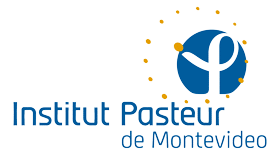Apicomplexan Biology
We focus on the study of a group of parasites, causative agents of both human and veterinary disease, collectively known as Apicomplexa. We aim to unravel the molecular mechanisms underlying these parasites’s ability to multipy and disseminate. With this, we aim to identify novel drug targets and drugs, to prevent these processes and more rapidly and effectively alleviate the diseases they cause.
Many, but not all, apicomplexans are able to cross the placental barrier causing abortion or congenital disease. We are interested in understanding the molecular basis of this capacitiy to cross such barrier, and their interactions with the host. Moreover, we are interested in understanding which specific strains of apicomplexans are present in our country,
and to which extent, in order to optimize treatments and diagnostics to what is locally relevant. Finally, we work in collaboration with the Parasitology and Micology department of the School of Medicine
to provide molecular unequivocal diagnosis of parasitic diseases. This allows us to carry out epidemiological surveys, and to better and more effectively treat individual patients.
Finances:

Members
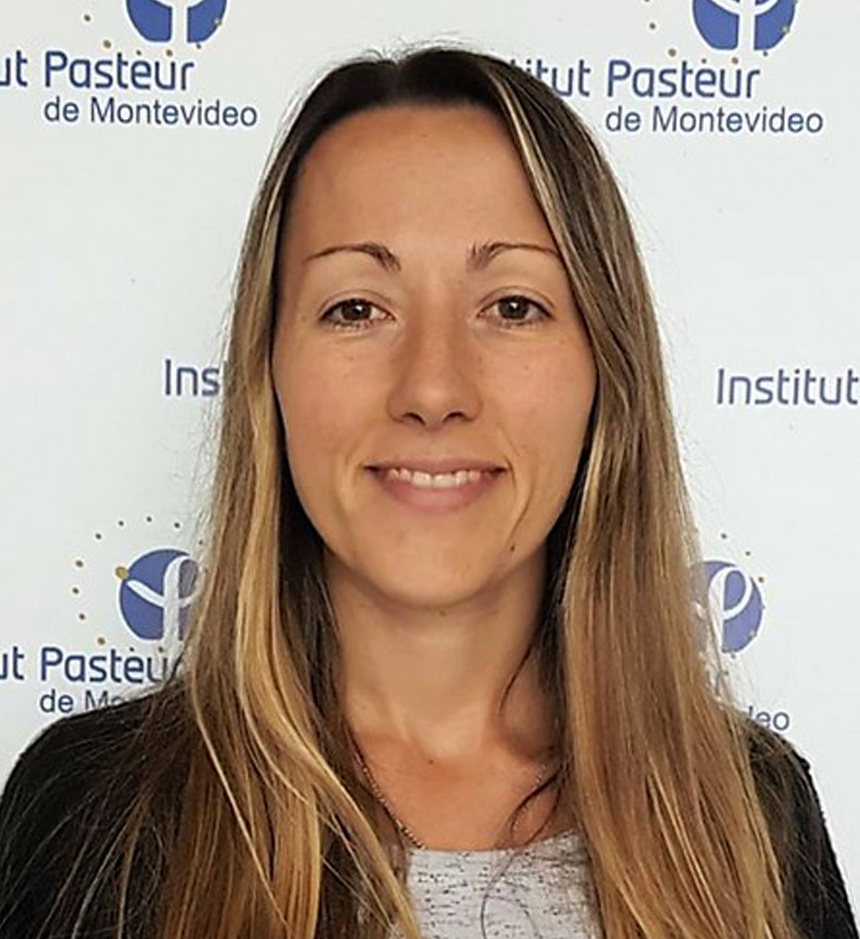
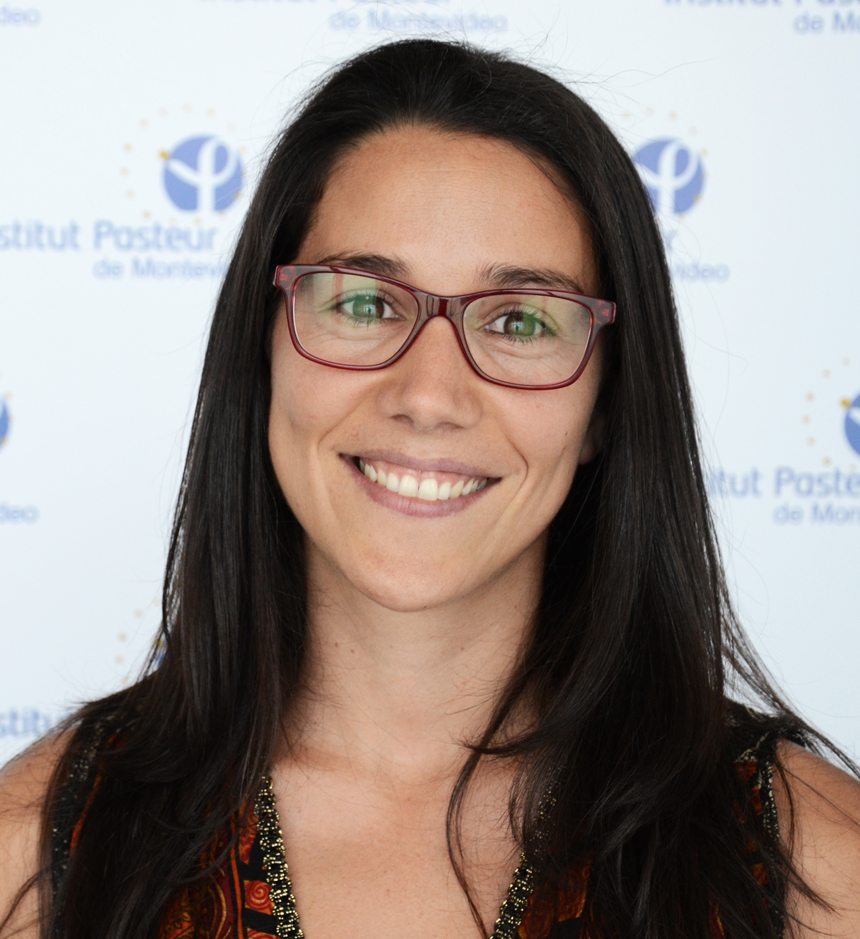
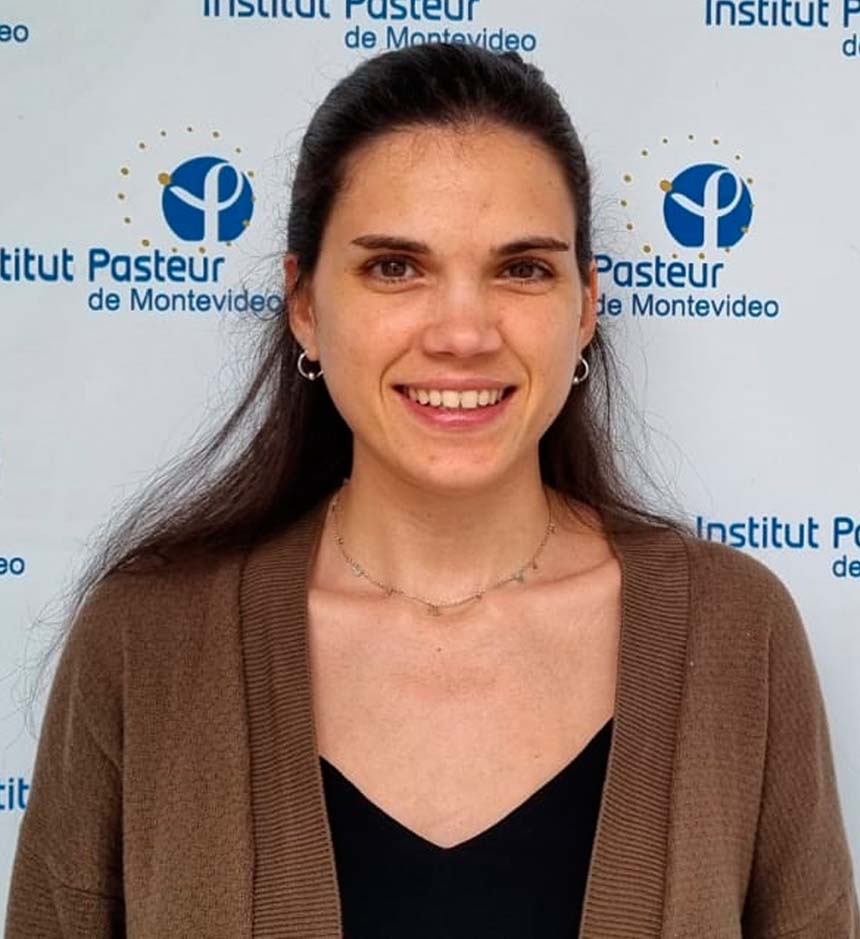




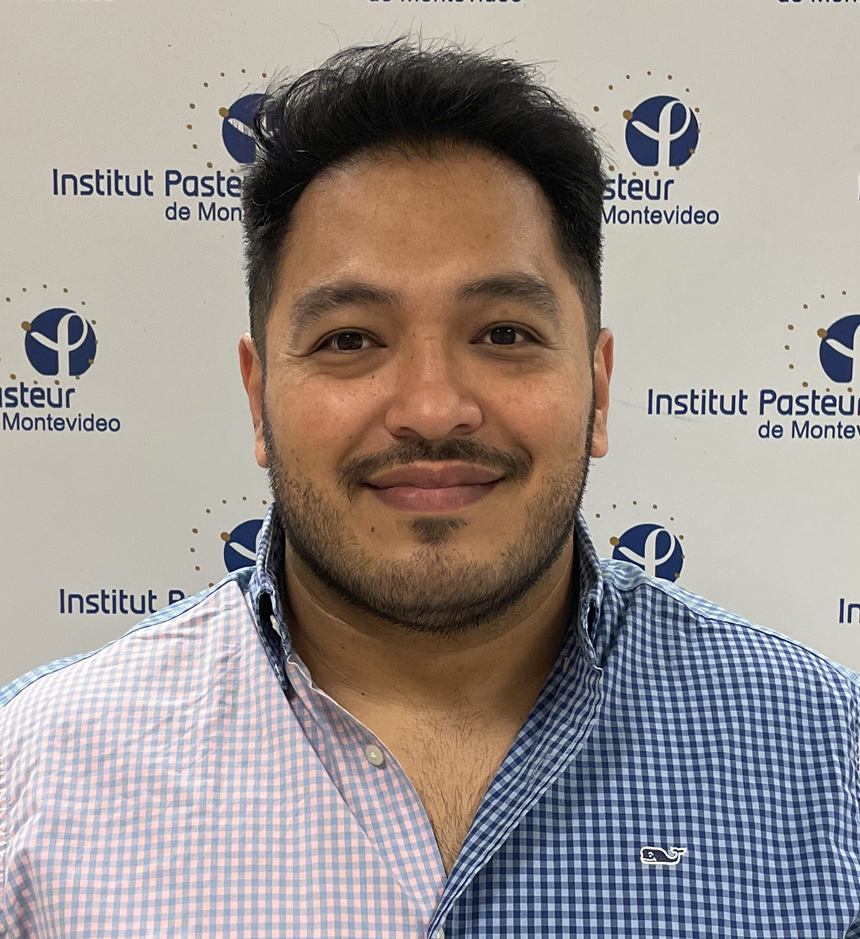
Eliana Tejera
Honorary intern
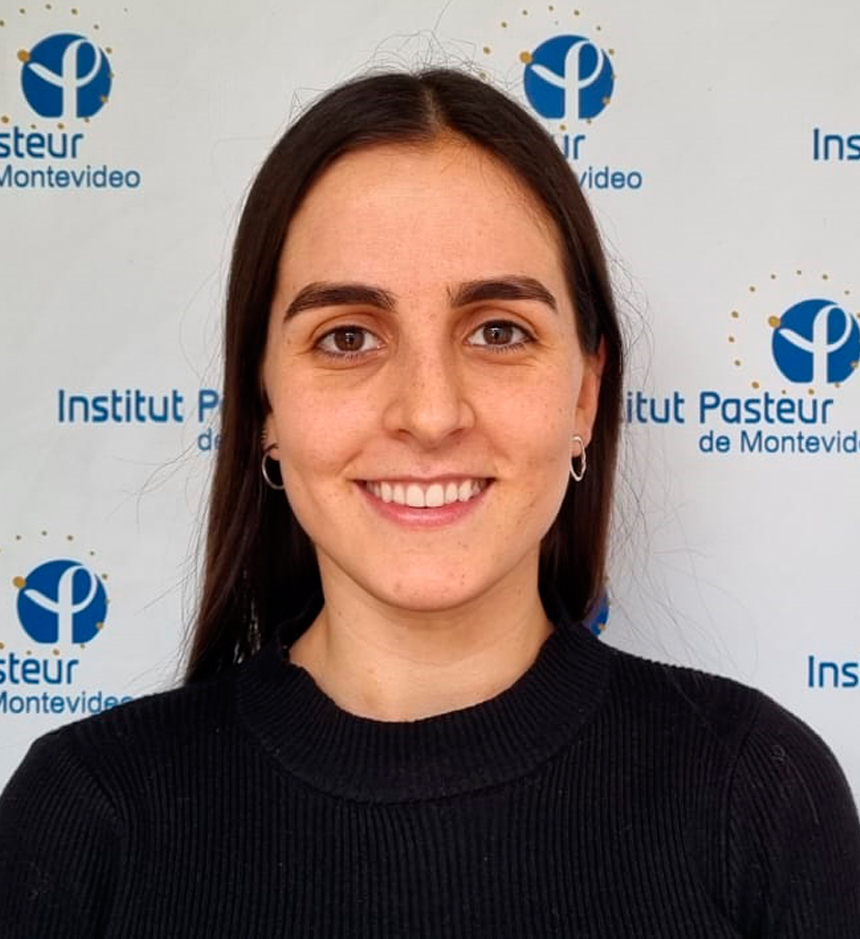
Josefina Bonomi
Honorary intern
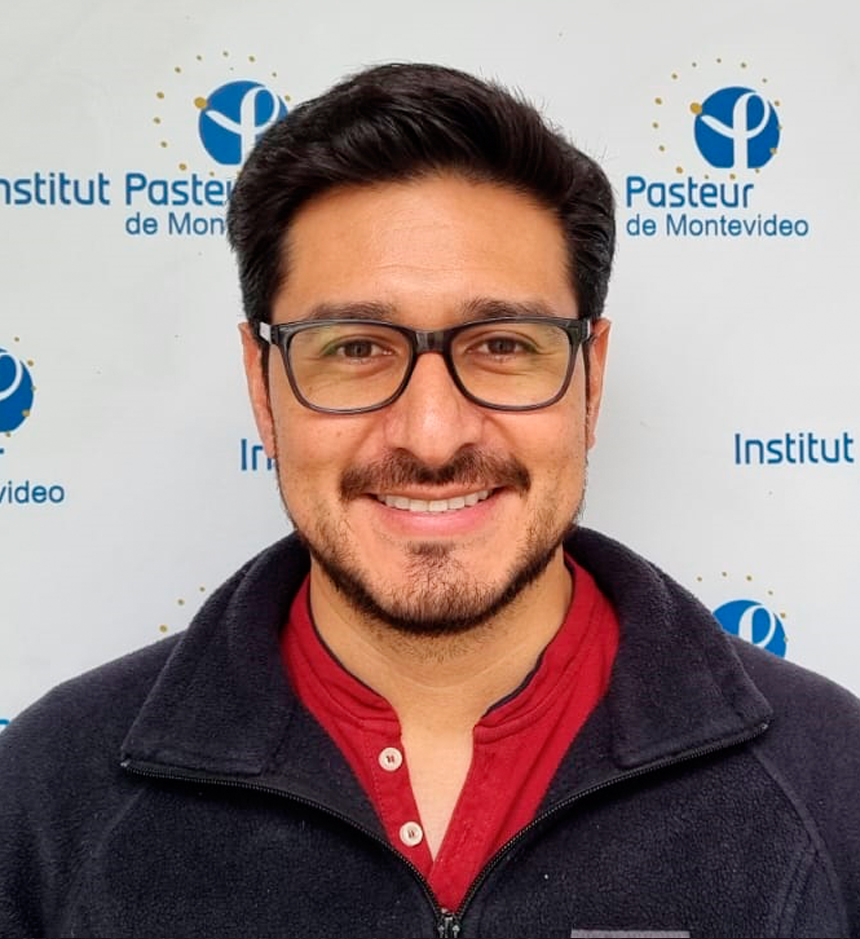
Danilo Solano
Doctoral student
Research lines
Systematic identification of proteins with a role in regulating T. gondii’s cell division.
Identification of novel centrosomal components in T. gondii.
Identification of the molecular mechanisms of vertical transmission of apicomplexan parasites.
Study of mitochondrial genome variability in apicomplexan parasites.
Determination of the mechanisms of sexed differentiation of Toxoplasma gondii.
Molecular epidemiology of circulating T. gondii strains in humans and productive animals.
Development of biotechnological products for the diagnosis and prevention of toxoplasmosis in production animals.
Courses
- “Genetic Manipulation in Unicelular Parasites”. March 2017.
Organized by M. Francia. - “Molecular Diagnosis of Parasitic Diseases”. Second semester 2019.
Department of Parasitology and Mycology. Faculty of Medicine (Udelar). - International course: ¨Latin American Biology of Parasitism: LatAm BoP 2022¨.
Projects
2017-2020 – Functional characterization of the apicomplexan parasite centrosome.
Responsible: María E. Francia. FCE-ANII
2017-2019 – Molecular and functional characterization of new national and regional isolates of Neospora caninum. Exploitation of its distinctive features in the rational design of diagnostic tools and prophylaxis to combat bovine Neosporosis.
Responsible: María E. Francia. PDN-ANII
2018-2020 – Systematic identification and functional analysis of novel centrosomal components in Toxoplasma gondii. Responsible: Maria E. Francia. ACIP-RIIP
2019-2022 – Quantification of embryonic and fetal losses in flocks of Uruguay and diagnosis of infectious agents involved. Responsible: Sergio Ferro (SUL). FCE-ANII
Main publications
vacio
2023
- Faral-Tello P, Pagotto R, Bollati-Fogolín M and Francia ME* (2023) Modeling the human placental barrier to understand Toxoplasma gondii´s vertical transmission. Front. Cell. Infect. Microbiol. 13:1130901. doi: 10.3389/fcimb.2023.1130901
- Horjales S, Li Calzi M, Francia ME, Cayota A and Garcia-Silva MR* (2023) piRNA pathway evolution beyond gonad context: Perspectives from apicomplexa and trypanosomatids. Front. Genet. 14:1129194. doi: 10.3389/fgene.2023.1129194
2022
- Tomasina R, Gonzalez C. F., Martins-Duarte É. S., Bastin P, Gissot M, Francia ME* (2022). Separate to operate: the centriole-free inner core of the centrosome regulates the assembly of the intranuclear spindle in Toxoplasma gondii. MBio. e01859-22. doi:10.1128/mbio.01859-22.
- Giannitti F*, Aráoz V, da Silva Silveira C, Francia ME, Robello C and Cabrera A (2022) A holstein heifer infected with Neospora caninum NcUru3 congenitally transmits this strain to a viable offspring although infection does not protect her from aborting by a different N. caninum genotype in the subsequent gestation. Front. Vet. Sci. 9:889157. doi: 10.3389/fvets.2022.889157
- Edreira MM*, Francia ME*, de Miguel N*. (2022) Editorial: Host/Parasite Molecular and Cellular Interactions in the Establishment and Maintenance of Protozoan Infections. Front. Cell. Infect. Microbiol., 24 May 2022. doi.org/10.3389/fcimb.2022.930073. *equal contribution
- Dorsch M, Francia ME, Tana LR, González FC, Cabrera A, Calleros L, Sanguinetti M, Barcellos M, Zarantonelli M, Ciuffo C, Maya L, Castells M, Mirazo S, Da Silva Silveira C, Rabaza A, Caffarena R, Díaz BD, Aráoz V, Matto C, Armendano JI, Salada S, Fraga M, Fierro S and Giannitti F. (2022) Diagnostic investigation of 100 cases of abortion in sheep in Uruguay: 2015-2021. Front. Vet. Sci., 19 May 2022. doi.org/10.3389/fvets.2022.904786
2021
- Berna L, Rego N, Francia ME. The elusive mitochondrial genomes of Apicomplexa: where are we now? (2021). Front. Microbiol. | doi: 10.3389/fmicb.2021.751775
- Mannise, N., Cabrera, A., Juan, H. Cosse, M., Giannitti, F., Francia, ME., González, T., Iriarte, A., Riet-Correa, F., Robello, C., González, S. (2021). Molecular detection of coccidian Apicomplexa Parasites isolated from wild crab-eating and pampas foxes through novel TaqMan™ probes: a contribution to their molecular epidemiology. Mol Biol Rep. doi.org/10.1007/s11033-021-06492-w
- Gissot M, Pawlowic MC, Modrzynska KK and Francia ME. (2021) Editorial: Molecular Basis of Stage Conversion in Apicomplexan Parasites. Front. Cell. Infect. Microbiol. 11:680184. doi: 10.3389/fcimb.2021.680184. In Press
- Berna L, Marquez P, Cabrera A, Greif G, Francia ME*, Robello C*. (2021) Reevaluation of two Apicomplexans genomes reveals misassembly, karyotype differences and lack of synteny. Genome Research. doi: 10.1101/gr.262832.120. In Press.
2020
- Tomasina R & Francia ME*. The structural and molecular underpinnings of gametogenesis in Toxoplasma gondii (2020). Front. Cell. Infect. Microbiol. 10:608291. doi: 10.3389/fcimb.2020.6082913.
- Francia ME*, Ting LM, Crocken M, Kim K, Dubremetz JF, Striepen B*. A homolog of Structural Maintenance of Chromosome 1 is a persistent centromeric protein which associates with nuclear pore components in Toxoplasma gondii. (2020). Front. Cell. Infect. Microbiol. 10:295. doi: 10.3389/fcimb.2020.00295 *co-corresponding authors
- Macías-Rioseco M, Silveira C, Fraga M, Casaux L, Cabrera A, Francia ME, et. al. (2020). Causes of abortion in dairy cows in Uruguay. Pesq. Vet. Bras. vol.40 no.5. May 2020 Epub July 17, 2020
- Moreno P, Moratorio G, Iraola G, Fajardo A, Aldunate F, Pereira-Gómez MN, Perbolianachis P, Costábile A, López-Tort F, Simón D, Salazar C, Ferrés I, Díaz-Viraqué F, Abin A, Bresque M, Fabregat M, Maidana M, Rivera B, Cruces ME, Rodríguez-Duarte J, Scavone P, Alegretti M, Nabón A, Rosa R, Bidegain E, Zarantonelli L, Piattoni V, Greif G, Francia ME, Robello C, Durán R, Sierra M, Cristina J, Marin M, Ehrlich R, Radi R, Cohen H, Colina R, Barbeito L, Pritsch O, Fernández C, Badano J, Arim R, Batthyány C, and Interinstitutional COVID-19 Working Group (2020). The Uruguayan Conundrum: key factors for a successful response to the COVID-19 crisis in a South American country. MedRxives preprint: 10.1101/2020.07.24.20161802
- Berna L, Marquez P, Cabrera A, Greif G, Francia ME*, Robello C. (2020) Reevaluation of two Apicomplexans genomes reveals misassembly, karyotype differences and lack of synteny. Genome Research In Press. BioRxiv 2020.05.22.111195; doi.org/10.1101/2020.05.22.111195.
2019
- Cabrera A, Berná L, Fresia P, Silveira C, Macias Rioseco M, Pritsch O, Riet-Correa F, Giannitti F, Francia ME*, Robello C*. (2019). Characterization of Four Novel Neospora Caninum Strains Reveals Underappreciated Regional and Worldwide diversity. Submitted. *co-corresponding author
2018
- Berry, L., Chen, CT, Francia, M.E. et al. (2018). Toxoplasma gondii chromosomal passenger complex is essential for the organization of a functional mitotic spindle: a prerequisite for productive endodyogeny. Cell. Mol. Life Sci.
2017
- Morlon-Guyot J, Francia ME, Dubremetz JF, Daher W. (2017). Towards a molecular architecture of the centrosome in Toxoplasma gondii. Cytoskeleton (Hoboken). 2017 Feb 7; 4(2):55-71.
2016
- Francia ME#, Dubremetz JF, Morrissette NS. (2016) Basal Body Structure and Composition in the Apicomplexans Toxoplasma and Plasmodium. Review series on Basal Bodies across Eukaryotes. Cilia. Feb 4; 5:3. #corresponding author.
Book chapters
- Francia, ME. “Toxoplasma cell division; back to the source” in Toxoplasma gondii: Prevalence and Role in Health and Disease, edited by Daniel Adesse and Erica Dos-Santos Martins-Duarte. (2021). Nova Publishers. New York, United States
- Francia, ME, Gissot, M., Modrzynska, K. K., Pawlowic, M. C., eds. (2021). Molecular Basis of Stage Conversion in Apicomplexan Parasites. Lausanne: Frontiers Media SA. doi: 10.3389/978-2-88966-843-4
